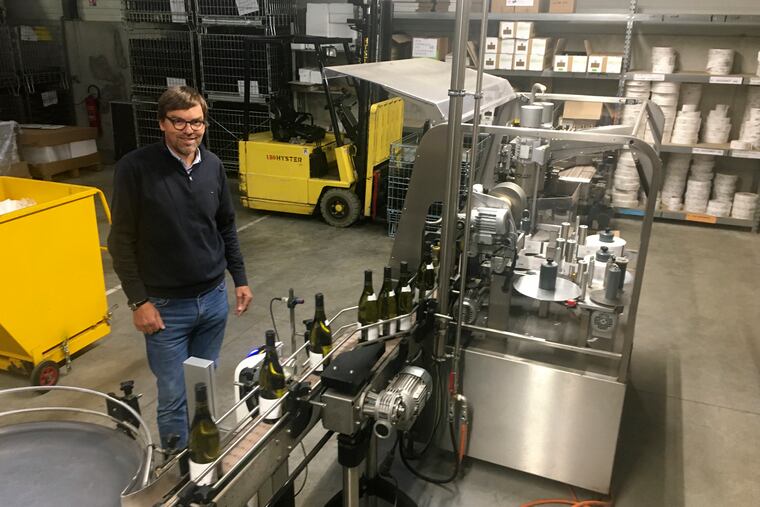New Trump tariffs feed fears for Pa. steel, port jobs
“The government is really hurting the little guy," says a steel company president. In Philadelphia's port, "the tonnage is down."

President Donald Trump’s new tariffs on South American steel, along with his doubling down on European and Asian import taxes, have some Pennsylvanians worried that the rising costs imposed by the federal government will threaten steel and port jobs.
While Trump’s team seemed to back off trade fights in recent weeks, the president raised the ante in recent days. Speaking from London Tuesday, Trump said he may wait until after the 2020 election to strike a trade agreement with China.
The administration has said it is contemplating new levies on French wine and other goods in retaliation for a new digital tax. And in a tweet Monday, Trump accused Brazil and Argentina of “presiding over a massive devaluation of their currencies, which is not good for our farmers. Therefore, effective immediately, I will restore the Tariffs on all Steel & Aluminum that is shipped into the U.S. from those countries.”
Can he do that? U.S. Sen. Pat Toomey (R., Pa.), long a Trump supporter, doesn’t think so. Trump claims authority to charge tariffs on imports under a law (Section 303 of the Trade Expansion Act of 1962) that is “exclusively meant for national security threats. Yet, the president has acknowledged that the real purpose of this action is to combat currency manipulation — which does not pose a national security threat,” Toomey complained in a statement hours after Trump’s Monday fiat.
Toomey, like other Pennsylvania elected officials, is a supporter of the domestic steel industry, which still employs thousands in Western Pennsylvania and hundreds at aging ArcelorMittal plants in Coatesville and Conshohocken and the U.S. Steel galvanizing plant near its former Fairless Hills works, and others.
U.S. steel manufacturers complain they have had to boost prices, which cost them some orders, due to higher costs for the rough foreign steel they shape into higher-value finished products.
In Farrell, Pa., north of Pittsburgh, Russian-owned steelmaker NLMK Pennsylvania laid off 100 of its 430 steelworkers and cut 35 salaried office positions this week, citing higher import costs since the Trump administration slapped 25% tariffs on imports from Russia and other countries last year, the Sharon Herald reported. The company’s president, Bob Miller, told the paper his firm had paid more than $160 million in tariffs so it could keep buying steel.
“This is very frustrating,” the steel company president added. “The government is really hurting the little guy.”
Delaware River ports have also seen a drop in import cargoes as tariffs rise, port officials say. “We are seeing the effect on steel from Europe. The tonnage is down,” said Sean Mahoney, spokesman for the city-owned Philadelphia city ports.
“That 25% ad valorum tax, on everything from Irish whiskey to Spanish clementines, hurt us on ship calls coming into the port,” Mahoney added. “This is the season for Spanish clementines,” and Philadelphia-area port terminals and refrigerated warehouses normally handle European fruit imports for Walmart and other national and regional grocers.
He added that Chilean fruit imports have not fallen this season, despite political unrest that has affected shipping from some parts of that South American country.
Toomey is pressing U.S. Sen. Charles Grassley (R., Iowa) to schedule committee hearings on a bill that would explicitly force Trump and future presidents to run import tax proposals through Congress instead of trying to claim national security privilege and imposing tariffs unilaterally.
Grassley supports farming interests, which have suffered after China slapped retaliatory tariffs on U.S. soybeans and other crops. The Trump administration’s “Market Facilitation Program,” which pays farmers who have lost exports due to new U.S. import taxes, has distributed $14.5 billion to farmers so far this year, up from $5.1 billion in its first year, 2018.
The tariff compensation now pays out far more than conservation, disaster, dairy, and all other taxpayer farm subsidy programs, U.S. Department of Agriculture data shows.
Trump’s accusation that the Latin Americans were deliberately cutting the value of their currencies was challenged by officials in both countries. “Our currency has a flexible exchange rate and adapts itself to global changes,” Argentina production minister Dante Sica told the New York Times. He told Reuters the move was “unexpected.”
Brazilian President Jair Bolsonaro, who has patterned his public style on Trump’s, told reporters he might ask Trump to back off.
Brazil and Argentina have actually been trying to strengthen their currencies, the Reuters news service reported. The Brazilian steelmakers’ association, searching for a more logical explanation of Trump’s new import taxes than the president’s currency claim, called it revenge for Brazilian soybean sales to China, replacing U.S. farm sales amid the U.S.-China tariff war.
Trump in his tweet also pressed the U.S. Federal Reserve to further ease pressures on U.S. business by dropping interest rates, which are already near record lows.
He has previously urged the Fed to consider following Japan and some European countries in posting negative interest rates. If Trump gets his way, U.S. depositors and bond buyers would pay banks to hold their money, instead of collecting interest.